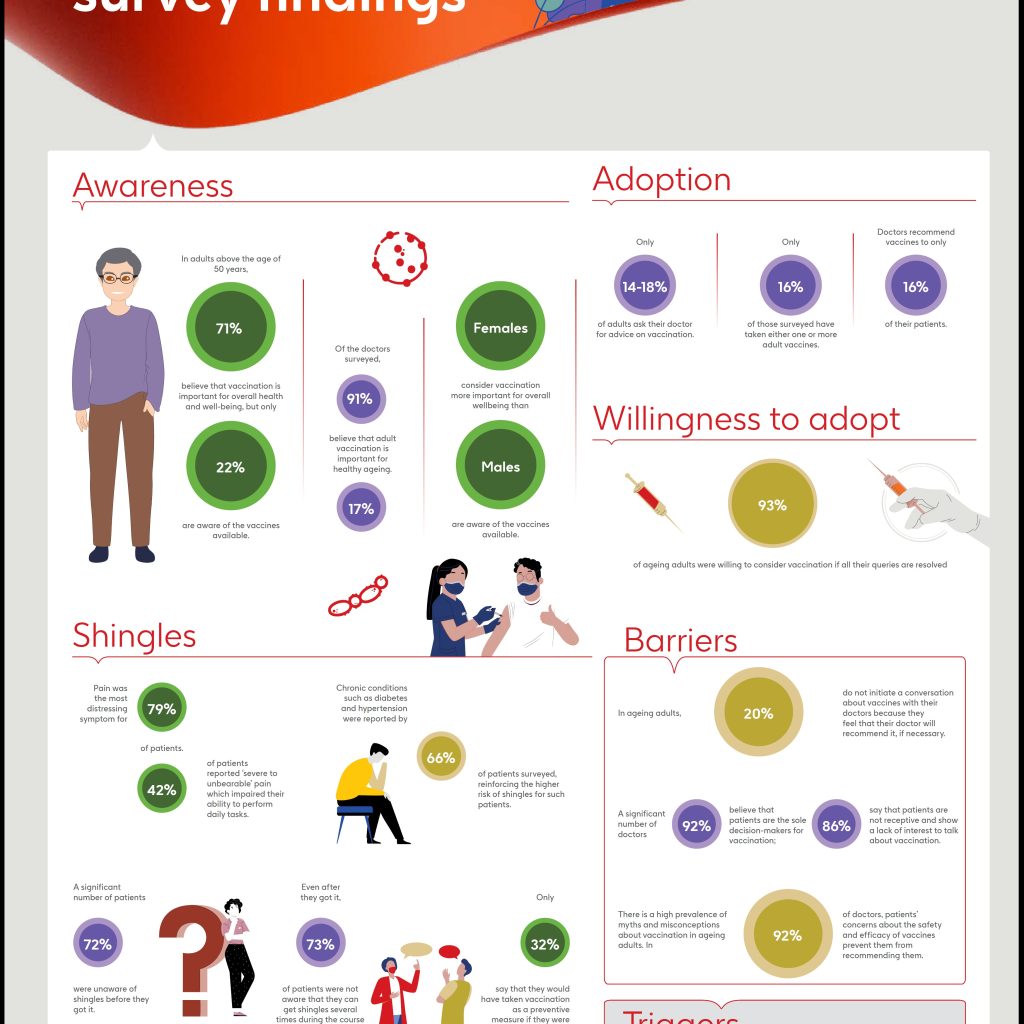A recently conducted survey by The Association of Physicians in India (API) and Ipsos, in 16 cities among adults aged 50 years and older, their caregivers and doctors has yielded compelling insights into why there is low adoption of adult immunisation in India. The survey shows that although 71% of adults aged ≥50 years are aware of adult vaccination, only 16% have taken any adult vaccines. Patients and doctors have provided significantly different reasons for low adoption.
A majority of doctors surveyed (90%) state that a lack of formal guidelines results in a lack of interest and adoption of vaccination by patients. Doctors also hesitate to discuss adult vaccination with their patients because they have limitations of time, and they also feel patients are less receptive to vaccination recommendations due to cost as well as prioritisation of treatment over prevention. Patients say that since they do not receive a firm recommendation from their doctors, they have not proactively taken adult vaccination. Many adults aged ≥50 (69%) and their caregivers (76%) do not ask doctors about adult vaccination because they believe that if they needed it, their doctors would recommend it. When asked about how to improve adult vaccination uptake, adult respondents (55%) and their caregivers (48%) said that measures such as those implemented for COVID-19 vaccination awareness can increase the adoption of adult vaccination.
In Nagpur and Surat, only 20% of adults aged ≥50 are aware of adult vaccination, and none have taken any adult vaccines. Almost all adults aged ≥50 (99%) would trust their doctor’s word if advised to get vaccinated. No adult above the age of 50 has been advised to take adult vaccination by doctors in Nagpur and Surat. Doctors from the West zone have concerns about the lack of patient receptivity towards adult vaccination, affordability of adult vaccines, and lack of availability of information on adult vaccination.

Dr. Nitin Shinde, Infectious Disease Specialist, The Association of Physicians of India, Nagpur said, “Ageing adults and their caregivers do not trust the safety and efficacy of adult vaccines which prevents them from getting vaccinated. Formal guidelines on adult immunisation can help build this trust. More conversations between doctors and patients about adult vaccination should be encouraged to reassure them and increase adoption of adult vaccination. People should also be educated about the dangerous complications of VPDs such as shingles for ageing adults and how vaccination can help them maintain their overall health and well-being.”
Certain misconceptions about adult vaccination also hold back adults from getting vaccinated. Many (50%) also believe that multiple doses of vaccines can make them dependent on vaccines. More than half of adults aged 50 years or older (58%) and their caregivers (62%) feel that there are better ways than vaccination to protect themselves or their parents/in-laws from diseases. In Nagpur and Surat, almost all adults aged 50 years or older (98%) feel the same and all believe that diseases other than COVID are not severe enough to require vaccination.
Since shingles is an important vaccine-preventable disease (VPD) amongst adults aged 50 years or older and there is low awareness about its prevention through vaccination, the second part of the survey was conducted with shingles patients aged 50 years or older to understand the level of awareness and impact of this condition on patients. Shingles, or Herpes Zoster, is caused by the reactivation of the chickenpox virus that resides in 90% of adults aged 50 years or older.ii It is an extremely painful condition where the pain can last for weeks or months. iii
The shingles survey shows that awareness about the condition is low in the country. Shingles patients find it difficult to differentiate between shingles and other skin conditions, resulting in delays in diagnosis that make the treatment less effective. Pain was the most distressing symptom for 79% of patients, and 72% were unaware of shingles before they got it. Even after they got it, 73% of patients were not aware that they can get shingles again. Chronic conditions such as diabetes and hypertension were reported by 66% of patients surveyed which made them more vulnerable to getting shingles and reinforced the need for such patients to get vaccinated.
👉 Click here to read the latest Gujarat news on TheLiveAhmedabad.com



